Steel Aircraft Hangar Building
Steel Aircraft Hangar Building
Home » Metal Buildings » Commercial » Steel Aircraft Hangar Building
Steel Aircraft Hangar Building
ZHM Steel manufactures customized Steel Aircraft Hangar Building, which protects and maintains small and large aircraft.
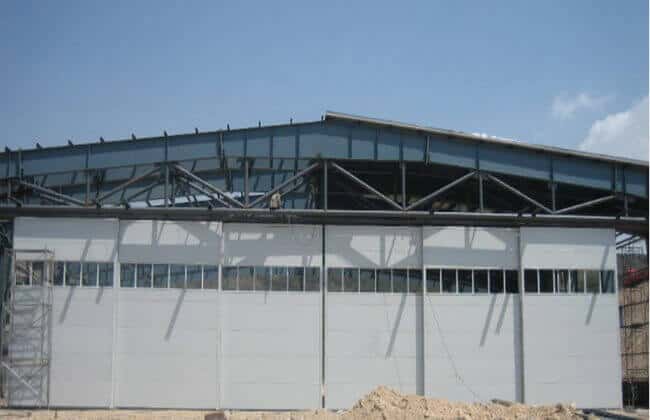
Steel Aircraft Hangar Building
Description of Steel Aircraft Hangar Building
Depending on the number of aircraft and requirements of the plane layout, building height, and structural form of the hangar building also differ, mainly depending on the following factors:
1) Simultaneous maintenance of aircraft type and quantity, maintenance items and the maintenance required;
2) Requirements and restrictions on height and plane layout of hangar structure ;
3) Requirements for the hangar door and crane and working platform in the hangar;
4) Configuration requirements for fire protection facilities inside and outside the hangar;
5) Site conditions and future development trends.
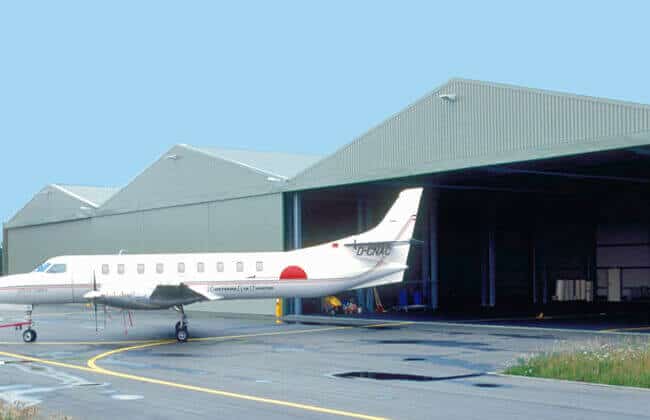
Steel Aircraft Hangar Building
1. Design of steel structure aircraft hangar:
1). The span and height of the hangar are relatively large. Generally, the span of a large aircraft hangar is more than 62m, and the height is about 20m. The span of a medium-sized aircraft hangar is also more than 42m.
2). To meet the aircraft requirements entering and exiting the hangar, the front of the hangar has a large opening and no pillars. The structure of the gate opening is a critical issue in the design of the large-span hangar structure.
3). To meet the hangar’s use requirements, the roof is required to have greater rigidity. In large wind loads, such as adopting a light roof system, engineers must consider the influence of wind suction on the structure when the door opened.
2. Structure of the aircraft hangar:
The plane layout and height requirements of the aircraft hangar are unique, which directly affects the structure of the building.
Due to the vast span of the hangar, the weight of the roof structure in the total load is significant. The steel structure has the advantages of high strength, lightweight, small cross-section. Therefore, steel structures generally used as load-bearing roof systems for large-span buildings, which can reduce the weight of the roof structure and reduce costs.
3. Fireproof design
The hangar has ample space, and many aircraft often maintained inside the building. So there are various maintenance equipment and working platforms accompanied by explosive sources of oil and gas combustion. There should be strict requirements and perfect facilities for fire and explosion protection. Currently, high-foam foam fire extinguishing systems mostly used.
The Door of Aircraft Hangar Building
The hangar door has a unique structure due to its large size and weight, and it needs to be easy to open. To make it easier for planes to enter and exit the hangar, the door usually designed according to the full height of the aircraft hangar. The total length divided into several fans, each of which is about 10-20 meters wide. There is a dedicated guide structure on the top of each door, and the bottom track wheel supports the door leaf, the door leaf made of the steel frame covered with a thin steel plate, the thickness of the door leaf about 500-700 mm.
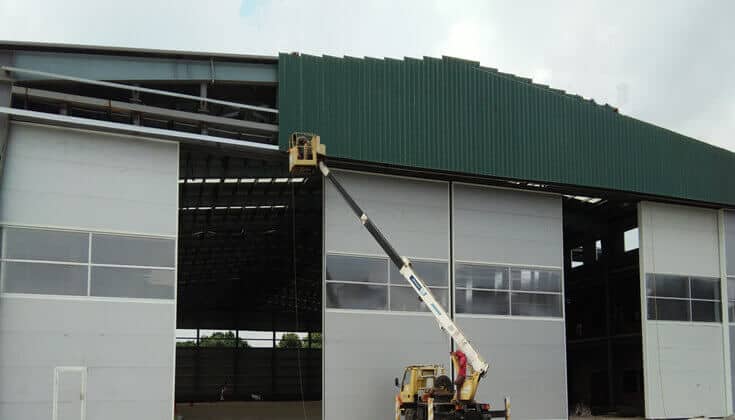
steel aircraft hangar
The rigid frame design at the hangar door:
Make a hanging column on the roof beam of a rigid frame at the hangar door. There is a beam between the hanging columns. Another steel frame is set up between 1-2 meters away from the rigid frame at the hangar door, and angle bracing welded on the two steel frames to form an enclosed structure.
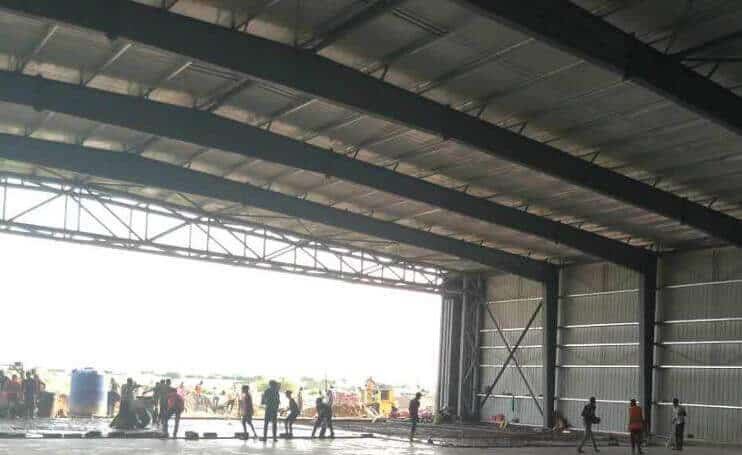
steel frame hangar door
The bottom beam hangs the rail of the gate. In this way, the two-fold frame suspension column + beam + angle steel cross brace on the entrance to form a box-shaped section, which strengthens the rigidity of the door.
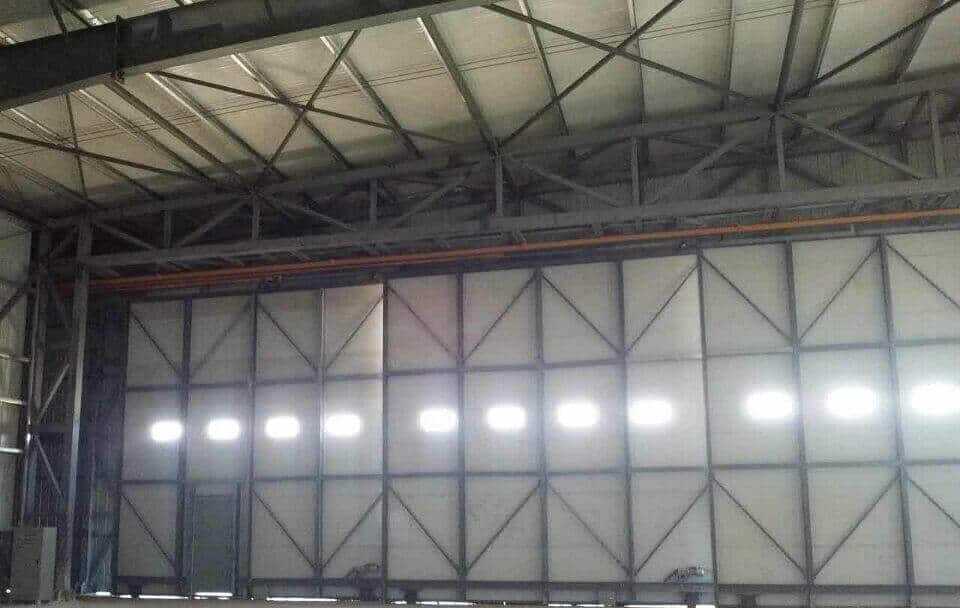
Steel door frame
Transmit the horizontal wind from the gate. A row of diagonal trusses intersects spatially between the joist and the adjacent rigid frame diagonal beam. The wind loading is transmitted to the roof through the inclined truss and then to the column bracing through the top bracing.
The Advantage of Steel Aircraft Hangar Building
Customized
Prefabricated steel structure building customized for aircraft. It is the ideal solution for storage and working on a variety of large machines. These structures can not only accommodate large aircraft doors but can also be customized to fit maintenance rooms, workshops, warehouses, offices, meeting rooms, etc. Since these structures designed for aircraft.
Flexible
One of the advantages of the steel structure building is design flexibility. It is particularly crucial for aircraft hangars, as several regulations must consider before construction of the airport begins.
Fast assembling
The elements of the metal hangar building system specially design to quickly joined. When metal parts arrive at the construction site, the skill level required for assembly significantly reduced.
Easily erection
Steel aircraft hangar buildings quickly and easily assemble, saving up to a third of construction time compared to traditional buildings. All frame components are prefabricated at the factory and easily assembled on-site using high-strength bolts. And self-drilling screws, which significantly reduces assembly costs.
- Pre:None
- Next:Steel Aircraft Hangar Building 2024/4/17
